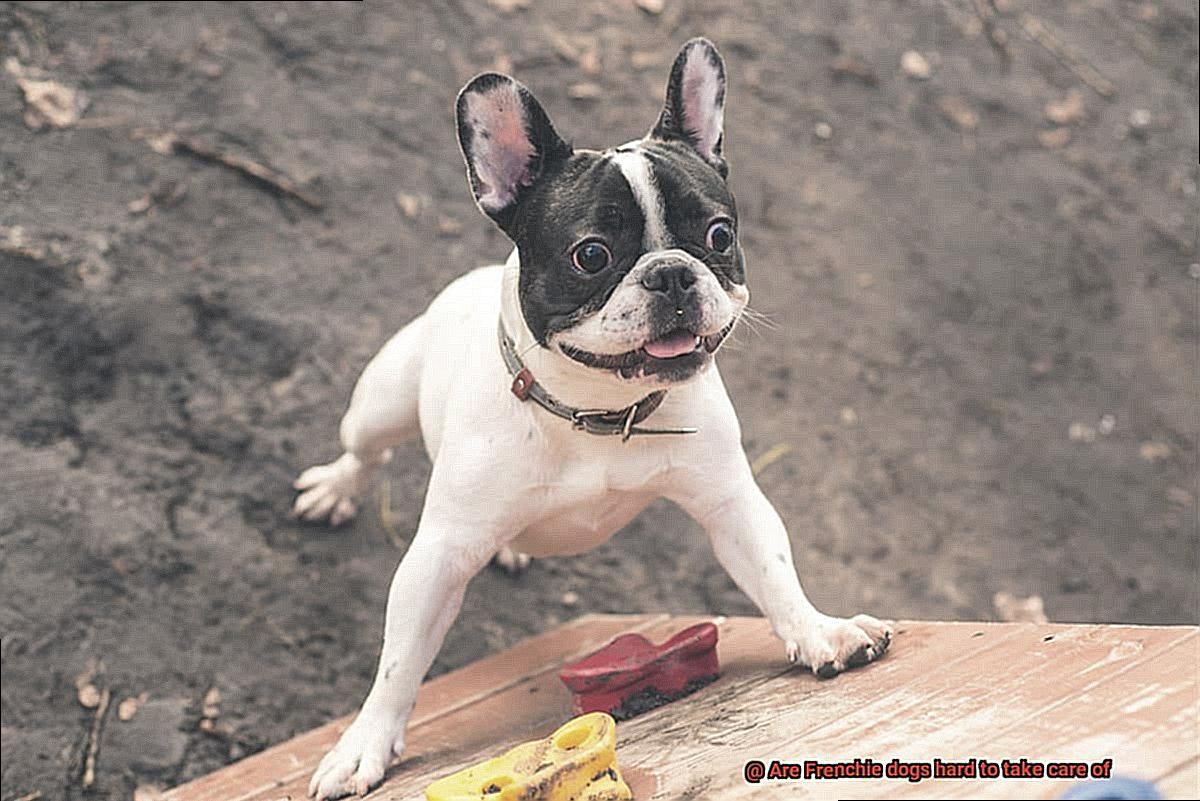Are Frenchie dogs hard to take care of?
Welcome to the world of Frenchie dogs – those irresistibly cute, bat-eared buddies who can steal your heart with a single inquisitive gaze. But let’s get real here: Are these little rascals as easy to care for as they are to fall head over paws in love with? As a proud Frenchie owner and self-proclaimed enthusiast, I’m here to spill the beans on what it takes to keep these four-legged friends happy and healthy. So buckle up, because we’re about to dive into the nitty-gritty details of Frenchie dog care.
Now, don’t get me wrong – Frenchie dogs are some of the friendliest and most lovable creatures on this planet. But let’s be honest, they do come with their own set of quirks and demands. In this blog post, we’ll explore their unique needs and dish out some valuable tips for anyone considering bringing one of these adorable furballs into their home.
First things first: Frenchie dogs require more attention than your average pup. They have a discerning palate that can lead them down the path of selective eating habits if you’re not careful. So feeding them a well-balanced diet is key to avoiding potential health issues down the line. And while exercise is important for all dogs, keep in mind that our flat-faced friends have a tendency to overheat easily. So moderate activities are best when it comes to keeping them fit and cool.
But wait, there’s more. As brachycephalic breeds, Frenchie dogs are prone to certain health concerns like breathing difficulties, eye problems, and spinal issues. That means regular visits to a specialized vet are essential for keeping your furry companion in tip-top shape.
Now before you start thinking that owning a Frenchie is all work and no play, let me assure you – it’s totally worth it. With the right knowledge and preparation, having a Frenchie by your side can be an incredibly rewarding experience.
From finding the perfect grooming routine to teaching them those oh-so-important commands, there are plenty of ways to meet the unique needs of these charming pets.
In future posts, we’ll delve deeper into various aspects of Frenchie dog care.
The Unique Appearance of French Bulldogs
Contents
- 1 The Unique Appearance of French Bulldogs
- 2 Exercise Requirements for French Bulldogs
- 3 Grooming Needs for Frenchies
- 4 Health Concerns for Brachycephalic Breeds
- 5 Eating Habits of French Bulldogs
- 6 Socialization and Training for French Bulldogs
- 7 Companionship Requirements for French Bulldogs
- 8 Conclusion
French Bulldogs are undeniably adorable with their bat-like ears, compact bodies, and expressive eyes. Their unique appearance is one of the reasons why they have become such beloved pets all over the world. In this article, we will explore the physical characteristics that make French Bulldogs stand out from other dog breeds.
- Bat-Like Ears: One of the most striking features of French Bulldogs is their erect and wide-set ears. These adorable ears give them a charming and alert expression. Not only do they enhance their overall appearance, but they also help to enhance their exceptional hearing abilities.
- Compact and Muscular Body: Despite their small size, French Bulldogs have a sturdy build with a well-developed chest and a strong bone structure. This gives them a robust appearance that belies their gentle and affectionate nature. They may be small, but they are certainly mighty.
- Flat-Faced Look: French Bulldogs have a distinctive flat face, with a short muzzle and a nose that is set back between their eyes. This unique facial structure, known as brachycephaly, is one of the defining features of the breed. However, it’s important to note that this flat-faced look can sometimes come with its own set of health issues.
- Wide Range of Coat Colors: French Bulldogs come in a wide range of coat colors and patterns. From shades of brindle, fawn, white, cream to rare colors like blue or lilac, there is a French Bulldog for every color preference. Some Frenchies also have distinctive markings such as a black mask on their face or white patches on their chest or paws.
- Cute and Comical Appearance: The overall appearance of French Bulldogs is often described as cute and comical. Their expressive eyes, wrinkled forehead, and compact size all contribute to their undeniable charm. It’s no wonder they are often referred to as “clowns” or “little clowns” due to their playful and entertaining nature.
Exercise Requirements for French Bulldogs
French Bulldogs, with their unique appearance and lovable personality, require regular exercise to keep them healthy and happy. Although they are not as active as some other breeds, it is important to provide them with appropriate exercise to prevent obesity and maintain their overall well-being.
Here, we will explore the exercise requirements for French Bulldogs and provide tips on how to keep them fit and active.
Daily Walks
Taking your French Bulldog for daily walks is essential for their physical and mental health. A 30-minute walk in the morning and another in the evening is typically sufficient for most Frenchies. These walks not only help them burn off energy but also stimulate their minds by exposing them to different sights, sounds, and smells. Remember to use a harness instead of a collar to avoid putting pressure on their delicate necks.
Interactive Play Sessions
Incorporating interactive play sessions into your French Bulldog’s exercise routine is a great way to keep them mentally stimulated and physically active.
Activities like fetch or tug-of-war are excellent choices as they engage your Frenchie’s natural instincts and provide a fun way to bond with them. Just make sure to use toys that are appropriate for their size and supervise the playtime to prevent any accidents.
Caution: Overheating
French Bulldogs are susceptible to overheating due to their brachycephalic (short-nosed) structure. Therefore, it is crucial to exercise caution when exercising them in hot weather or high temperatures. Schedule exercise sessions during cooler parts of the day, such as early morning or late evening, and always provide plenty of fresh water and shade for your Frenchie.
Keep an eye out for signs of heat exhaustion, such as excessive panting or difficulty breathing, and take breaks if necessary.
Swimming
Swimming can be an excellent low-impact exercise for French Bulldogs. It provides a full-body workout while reducing stress on their joints. However, it is important to remember that not all French Bulldogs are natural swimmers, and their brachycephalic airway can make swimming challenging for them. Always supervise your Frenchie closely around water and consider using a flotation device to ensure their safety.
Avoid Excessive Exercise
French Bulldogs are not built for endurance or intense physical exertion. They have a limited tolerance for exercise due to their brachycephalic airway, which can lead to breathing difficulties and exhaustion.
It is important to avoid excessive exercise or high-intensity activities that may put too much strain on their respiratory system. Pay attention to your Frenchie’s cues and adjust the intensity and duration of exercise accordingly.
Grooming Needs for Frenchies
As an experienced Frenchie owner and enthusiast, I’ve learned a thing or two about their grooming needs, and I’m here to share my expertise with you. So, let’s dive into the wonderful world of Frenchie grooming.
Coat Care:
French Bulldogs have a short and smooth coat that doesn’t require extensive grooming. However, they do shed, especially during seasonal changes. To keep the shedding under control, regular brushing with a soft-bristle brush or grooming mitt can help remove loose hair and minimize the amount of fur floating around your house.
Bathing Beauties:
When it comes to bathing your Frenchie, less is more. These dogs have sensitive skin, so bathing them too frequently can strip away their natural oils and cause dryness. Aim to bathe your Frenchie every 2-3 months or as needed. Use a gentle dog shampoo specifically formulated for sensitive skin, rinse thoroughly, and dry them off completely to avoid any skin irritation.
Eye-Catching:
French Bulldogs have those big, beautiful eyes that can sometimes be prone to tearing and staining. To keep their peepers clean and bright, gently wipe around their eyes with a damp cloth or use a tear stain remover specifically designed for dogs. This will help prevent unsightly stains and keep their eyes healthy.
Nail Trimming:

Just like humans need regular nail trims, Frenchies do too. Overgrown nails can be uncomfortable for your furry friend and even cause issues with their gait. Invest in a good pair of dog nail clippers and trim their nails regularly. Be careful not to cut too close to the quick (the sensitive part of the nail), as this can cause bleeding and pain. If you’re unsure, ask your vet or a professional groomer for assistance.
Dazzling Dental Hygiene:
Oral health is essential for French Bulldogs, as they are prone to dental issues like gum disease and tooth decay. Get into the habit of regularly brushing their teeth with a dog-friendly toothpaste and a soft-bristle toothbrush. You can also promote good dental hygiene by providing dental chews or toys that help clean their teeth naturally.
Ears to You:
Frenchies have adorable bat-like ears that require regular attention. Check their ears weekly for any signs of infection, redness, or excessive wax buildup. If needed, gently clean their ears with a vet-approved ear cleaning solution and cotton balls or pads. Avoid using cotton swabs, as they can push debris further into the ear canal and cause harm.
Health Concerns for Brachycephalic Breeds
It’s important to be aware of the health concerns that come with owning a brachycephalic breed like the French Bulldog. In this article, we’ll explore the common health issues these dogs face and provide you with practical tips on how to care for your Frenchie’s well-being.
Brachycephalic Airway Syndrome (BAS):
Brachycephalic breeds are prone to respiratory problems due to their short muzzles and flat faces. BAS is a collection of conditions that can make breathing difficult for French Bulldogs. Symptoms may include narrowed nostrils, an elongated soft palate, and a small windpipe. If you notice your Frenchie struggling to breathe, exhibiting noisy breathing or snoring, it’s essential to consult your veterinarian.
Heat Sensitivity:
French Bulldogs have a reduced ability to cool down efficiently due to their compromised airways. This makes them more susceptible to heatstroke, especially in hot weather or during physical activity. Remember to provide your Frenchie with plenty of shade, fresh water, and avoid exposing them to excessive heat. Be vigilant and look out for signs of overheating such as excessive panting, drooling, or weakness.
Eye Problems:
The large and protruding eyes of French Bulldogs make them more prone to eye injuries, dryness, ulcers, and other ophthalmic issues. Regular visits to the veterinarian for eye examinations can help detect any problems early on and ensure proper care is provided.
Skin Fold Dermatitis:
The adorable wrinkles on a French Bulldog’s face can trap moisture and bacteria, leading to skin fold dermatitis. Regular cleaning and drying of these folds are crucial to prevent infections. Use a gentle cleanser recommended by your veterinarian and ensure the folds are thoroughly dried after cleaning.
Dental Issues:
Brachycephalic breeds often suffer from dental problems due to their crowded teeth and narrow jaws. Regular dental care, including brushing their teeth and providing appropriate chew toys, can help maintain good oral hygiene and reduce the risk of dental diseases.
Addressing Obesity:
French Bulldogs have a tendency to gain weight easily, which can exacerbate their breathing difficulties and increase the risk of other health issues. A balanced diet and regular exercise are essential to keep them at a healthy weight. Consult your veterinarian for guidance on your Frenchie’s specific dietary needs.
Eating Habits of French Bulldogs
French Bulldogs, also known as Frenchies, are beloved pets known for their adorable appearance and loving nature. To ensure the well-being of your Frenchie, it’s crucial to understand their eating habits and provide them with a balanced diet. In this article, we will explore the eating habits of French Bulldogs and offer valuable tips for maintaining their health and happiness.
Establishing a Feeding Routine:
French Bulldogs have a hearty appetite, making it important to establish a feeding routine to prevent overeating. Set regular meal times and avoid leaving food out all day. This will help regulate their calorie intake and prevent obesity-related health issues.
Choosing the Right Food:
Opt for high-quality dog food specifically formulated for French Bulldogs. Look for options with real meat as the primary ingredient and avoid fillers like corn or wheat. Experiment with different brands or types of food to find the best fit for your Frenchie, as they can be prone to food allergies.
Feeding Environment:
Create a calm and quiet environment during mealtime to avoid distractions. French Bulldogs are easily distracted, so minimizing disturbances will help them focus on their food. Elevating their food bowls can also prevent swallowing air while eating, reducing the risk of bloating or gas.
Forbidden Foods:
Keep your Frenchie safe by avoiding toxic foods such as chocolate, onions, garlic, grapes, and raisins. These can cause serious health problems if ingested. Also, steer clear of fatty or spicy foods that can upset their sensitive digestive system.
Preventing Gulping:
French Bulldogs have a tendency to gulp their food quickly, which can lead to choking or digestive issues. Slow-feed bowls or puzzle feeders can slow down their eating pace. Alternatively, divide their meals into smaller portions throughout the day to encourage slower consumption.
Hydration is Key:
Ensure fresh and clean water is always available to your Frenchie. Monitor their water intake, especially in hot weather or during physical activities, as Frenchies can overheat easily.
Weight Management:
Regularly monitor your Frenchie’s weight and body condition. Adjust portion sizes accordingly to maintain a healthy weight. Consult with your veterinarian if you have concerns about their eating habits or weight management.
Socialization and Training for French Bulldogs
French Bulldogs, or Frenchies as they are lovingly called, are known for their friendly and sociable nature. However, like any other breed, they require proper socialization and training to become well-behaved and happy companions. Let’s explore why socialization and training are so important for French Bulldogs.
Socialization
Socialization plays a crucial role in the development of French Bulldogs. It involves exposing them to various people, animals, and environments from a young age. This helps them become comfortable and confident in different situations, reducing the chances of fear or aggression later in life. Gradually introducing your Frenchie to new experiences with positive reinforcement is key to successful socialization.
Puppy classes and obedience training

Attending puppy classes or enrolling your Frenchie in obedience training can be immensely beneficial. These classes provide a structured environment where they can learn basic commands, proper behavior, and good manners. Training sessions also help establish a bond between you and your Frenchie. Positive reinforcement techniques, such as treats, praise, and play, work best with Frenchies due to their sensitive and eager-to-please nature.
Consistency is key
French Bulldogs thrive on routine and clear boundaries. Establishing a regular schedule for feeding, potty breaks, walks, and playtime helps them feel secure and understand what is expected of them. Frenchies are intelligent dogs that quickly pick up on routines and cues. By consistently reinforcing desired behaviors and discouraging unwanted ones, you can effectively train your Frenchie to be well-behaved.
Patience and positive reinforcement
French Bulldogs may have a stubborn streak at times, making training challenging. However, patience and positive reinforcement can go a long way in overcoming this hurdle. Avoid harsh training methods or punishment as this can damage the bond between you and your Frenchie.

Mental and physical stimulation
French Bulldogs thrive on human interaction and can suffer from separation anxiety if left alone for long periods. They desire constant attention and affection. Providing plenty of mental and physical stimulation through play, walks, and interactive toys can help alleviate any separation anxiety or destructive behaviors.
Companionship Requirements for French Bulldogs
French Bulldogs thrive on social interaction and require a significant amount of companionship from their owners. If you’re considering getting a French Bulldog, it’s important to understand their companionship requirements to ensure you can meet their needs.
- Time and Attention: French Bulldogs crave attention and love spending time with their human companions. They are not suited for households where they will be left alone for long periods of time. Be prepared to spend quality time with your Frenchie, providing them with the attention they need.
- Separation Anxiety: French Bulldogs are prone to separation anxiety, which can lead to destructive behavior or excessive barking. To prevent this, it’s recommended to have another dog or pet in the household as a companion for your Frenchie, especially if you’ll be away for extended periods. This can help alleviate their anxiety and keep them company.
- Exercise and Mental Stimulation: Regular exercise is essential for keeping French Bulldogs happy and healthy. Take your Frenchie for daily walks or play interactive games that get them moving. Additionally, provide them with mental stimulation through puzzle toys or training sessions. This will keep them mentally sharp and prevent boredom.
- Training and Boundaries: French Bulldogs have a tendency to develop strong bonds with their owners and may become overly attached. It’s crucial to establish boundaries and provide consistent training from a young age. This will help prevent behavioral issues and ensure your Frenchie understands what is expected of them.
- Socialization: French Bulldogs can get along well with other dogs and pets if properly socialized from a young age. Introduce them to different environments, people, and animals to help them become well-rounded companions.
It’s important to consider your own lifestyle and availability before getting a French Bulldog. These dogs require constant companionship and may not do well in households where they are left alone most of the time. If you can provide the necessary time, attention, and love, a French Bulldog can be a wonderful companion for years to come.
Em5WE9QFfa0″ >
Conclusion
In conclusion, caring for Frenchie dogs can be quite a challenge.
Their unique physical characteristics, such as their short noses and compact bodies, require special attention and care. From dealing with potential breathing issues to managing their exercise needs, it’s important to be prepared for the responsibilities that come with owning a Frenchie.
Additionally, their sensitive skin and susceptibility to allergies mean that grooming and diet must be carefully considered. However, despite these challenges, the love and companionship that Frenchie dogs provide make it all worthwhile.
With proper knowledge and dedication, anyone can successfully care for a Frenchie and enjoy the joy they bring into their lives.




